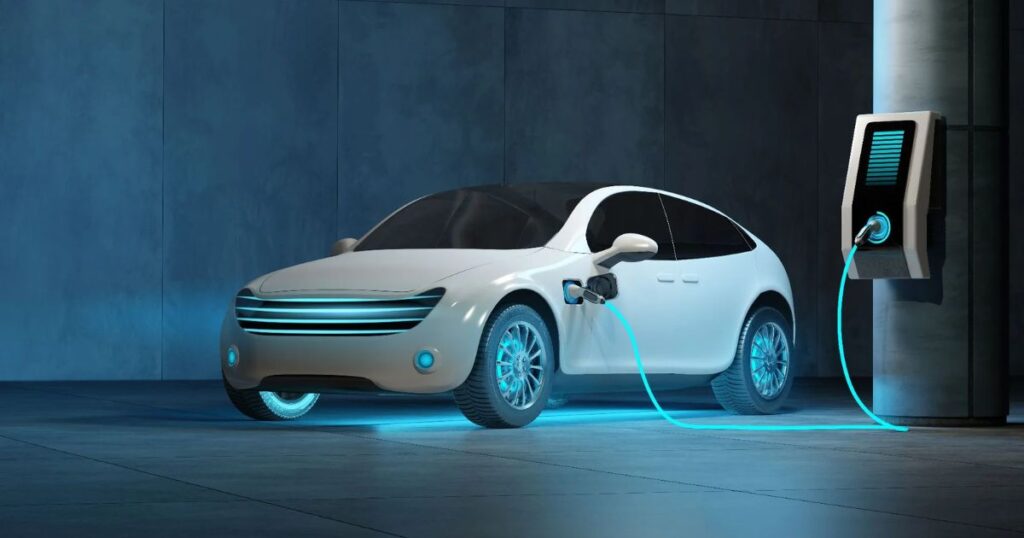As electric vehicles (EVs) continue to gain popularity, a common question arises: “How much does it cost to charge an electric car?” The answer isn’t as straightforward as you might think, as several factors influence the cost of EV charging.
Let’s delve into this topic and explore the various considerations that determine the cost to charge an electric car.
Key Takeaways
- It costs around $0.05 per mile to charge an EV, compared to roughly $0.13 per mile for a gas-powered vehicle.
- Charging an EV at home typically costs between $56 to $100 per month, depending on factors like electricity rates, battery size, and charging habits.
- The upfront cost of an EV is generally higher than a comparable gas-powered car, but EVs tend to be more cost-effective over their lifetime due to lower fuel and maintenance costs.
- Factors like your electricity source, EV battery size, charger type, location, and charging time can significantly impact your home EV charger cost.
- Public Level 2 vs Level 3 chargers offer different charging speeds and pricing structures.
How do you calculate the cost of charging an electric car?
To calculate the cost of charging an electric car, you need to know two critical pieces of information:
- Your utility or electricity provider’s electricity rate (cost per kilowatt-hour, or kWh).
- Your EV’s battery capacity (in kWh).
The basic formula is:
Cost to Charge = Battery Capacity (kWh) x Electricity Rate ($/kWh)
However, it’s important to note that not all the electricity used during charging goes directly into the battery due to energy losses. Factors like the charger type and environmental conditions can impact the overall efficiency of the charging process.
For example, you have a Nissan Leaf with a 40 kWh battery, and your electricity rate is $0.12 per kWh. Using the formula above, the cost to fully charge your Leaf would be:
Cost to Charge = 40 kWh x $0.12/kWh = $4.80
But in reality, you may need to account for an additional 15-20% in energy losses, increasing the actual cost to around $5.50 – $5.75 for a full charge.
How much does it cost to charge a Nissan Leaf?
Here are some specific cost examples for charging different Nissan Leaf models using the average U.S. electricity rate of $0.1619 per kWh:
| EV Model | Battery Capacity | Energy Required to Charge | Cost to Charge | Range | Cost per Mile |
| Nissan Leaf S | 45 kWh | 51.75 kWh | $8.38 | 149 miles | 5.6 cents |
| Nissan Leaf SV Plus | 65 kWh | 74.75 kWh | $12.10 | 212 miles | 5.7 cents |
How much does it cost to charge a Tesla Model 3?
For Tesla’s popular Model 3 sedan, costs can vary based on the trim level:
| EV Model | Battery Capacity | Energy Required to Charge | Cost to Charge | Range | Cost per Mile |
| Tesla Model 3 Standard | 60 kWh | 69 kWh | $11.17 | 272 miles | 4.1 cents |
| Tesla Model 3 Long Range | 82 kWh | 94.3 kWh | $15.27 | 358 miles | 4.3 cents |
| Tesla Model 3 Performance | 82 kWh | 94.3 kWh | $15.27 | 315 miles | 4.8 cents |
How much does it cost to charge a Hyundai IONIQ 5?
Hyundai’s popular IONIQ 5 EV crossover offers two battery options:
| EV Model | Battery Capacity | Energy Required to Charge | Cost to Charge | Range | Cost per Mile |
| Hyundai IONIQ 5 SE Standard Range | 58 kWh | 66.7 kWh | $10.80 | 220 miles | 4.9 cents |
| Hyundai IONIQ 5 SE/SEL | 77.4 kWh | 89.01 kWh | $14.41 | 303 miles | 4.8 cents |
How much does it cost to charge an Audi Q4 e-tron?
For Audi’s electric Q4 e-tron SUV, charging costs look like:
| EV Model | Battery Capacity | Energy Required to Charge | Cost to Charge | Range | Cost per Mile |
| Audi Q4 Sportback e-tron | 77 kWh | 88.55 kWh | $14.34 | 242 miles | 5.9 cents |
| Audi Q4 e-tron | 82 kWh | 94.3 kWh | $15.27 | 265 miles | 5.8 cents |
Cost to charge an EV vs. gas fuel fillup
One of the biggest advantages of owning an electric vehicle is the potential cost savings on “fuel” compared to a gas-powered car. In general, you can expect to pay around:
- $0.05 per mile to charge your EV
- $0.13 per mile to fuel a comparable gas vehicle
As of May 2024, the national average gas price is $3.28 per gallon for regular gasoline and $4.06 for premium. In contrast, electricity rates are far more stable and typically cheaper than gas, even accounting for volatility in some markets.
How much does it cost to fuel popular gas-powered vehicles?
To illustrate the difference, let’s look at fuel costs for some popular gas-powered models:
| Make & Model | Fuel Tank Capacity | Combined MPG | Cost to Fill Tank* | Range | Cost per Mile |
| Toyota Corolla Hatchback | 13.2 gallons | 35 MPG | $43.30 | 462 miles | 9.4 cents |
| Honda Civic LX | 12.4 gallons | 36 MPG | $40.67 | 434 miles | 9.4 cents |
| Kia Telluride AWD | 18.8 gallons | 22 MPG | $61.66 | 414 miles | 14.9 cents |
| Porsche Macan** | 19.8 gallons | 21 MPG | $80.39 | 416 miles | 19.3 cents |
Based on $3.28/gallon for regular gas, $4.06/gallon for premium
*Porsche Macan requires premium gasoline
Cost per charge/tank for popular EVs and comparable gas vehicles
| Vehicle Category | EV Charging Cost per Mile | Gas Fueling Cost per Mile |
| Compact Hatchback | Nissan Leaf: 5.6 cents | Toyota Corolla Hatchback: 9.4 cents |
| Compact Sedan | Tesla Model 3: 4.1 – 4.8 cents | Honda Civic LX: 9.4 cents |
| Mid-size SUV | Hyundai IONIQ 5: 4. |
How much does it cost to charge your EV at home?
Home charging is the primary and most convenient way for most EV owners to keep their vehicle’s battery topped up. The overall cost to charge an electric car at home depends on several key factors:
1. Your electricity source
Charging your EV with grid-supplied electricity from your utility will generally cost more than charging with solar power from home solar panels. Programs like community solar, community choice aggregation (CCA), or green power purchasing can also help reduce your home EV charger cost.
2. Your EV’s battery size
Larger batteries require more energy to charge, increasing costs entirely. However, a bigger battery also provides an extended driving range, lowering the cost per mile.
3. The type of EV charger you use
There are three main types of EV chargers:
- Level 1 (120V): The slowest, using a regular household outlet. Less energy efficient.
- Level 2 (240V): Most common for home charging. Faster than Level 1.
- Level 3 (400V+): Fastest option found at public charging stations. Most energy efficient.
Level 1 and 2 chargers convert AC power to the DC power used by the EV battery, causing some energy losses. Level 3 DC fast chargers are more efficient but can degrade batteries with frequent rapid charging over time.
4. Where you live
Residential electricity rates vary widely across the U.S. and the UK. Some states, like Hawaii, California, and New England, have the highest rates, while others, like Louisiana, Oklahoma, and Arkansas, have the lowest.
5. When you charge your EV
Many utilities offer time-of-use or variable pricing plans where electricity costs fluctuate based on demand. Charging during off-peak hours (like overnight) can significantly reduce your EV charging cost.
How much does charging your EV at a public charging station cost?
As public charging infrastructure expands, it provides more options beyond just charging at home. Most public chargers are Level 2 or Level 3, with costs ranging from:
- Free (e.g., workplace, retail chargers)
- $0.25 – $0.50 per kWh
- $3 – $8 per hour
- $10 – $30 for a full charge
Apps like PlugShare and ChargePoint allow you to find public charging locations and view real-time pricing/availability. Some public stations may also charge parking fees in addition to the charging cost.
How far can an EV go on one charge?
A common concern for potential EV buyers is driving range – how far the vehicle can travel on a single charge. EV ranges have improved significantly but still tend to be lower than a comparable gas vehicle’s range per gas tank.
Distance per charge/tank for popular EVs and gas vehicles
| Vehicle Category | EV Range | Gas Vehicle Range |
| Compact Hatchback | Nissan Leaf: 149 miles | Toyota Corolla: 462 miles |
| Compact Sedan | Tesla Model 3: 272-358 miles | Honda Civic: 434 miles |
| Mid-size SUV | Hyundai IONIQ 5: 220-303 miles | Kia Telluride: 414 miles |
| Luxury SUV | Audi Q4 e-tron: 242-265 miles | Porsche Macan: 416 miles |
Electric vehicle incentives
It’s worth noting that federal EV tax credits up to $7,500 (plus potential state/local incentives) can help offset the higher upfront costs of an EV purchase. These incentives and lower fuel and maintenance costs can make an EV more cost-effective over its lifetime.
Pros and cons of EV vs gas-powered vehicles
Beyond just costs, there are several vital pros and cons to weigh when considering an electric versus gas-powered vehicle:
Pros of EVs:
- Lower fuel/operating costs
- Zero direct emissions
- Low maintenance requirements
- Access to carpool/HOV lanes in some areas
- Smoother, quieter driving experience
Cons of EVs:
- Higher upfront purchase prices
- Limited driving ranges (improving)
- Longer “refueling” times
- Lack of public charging in some areas
Pros of Gas Vehicles:
- Typically, lower purchase prices
- Can travel farther before refueling
- Widespread fuel availability
- Faster “refueling” times
Cons of Gas Vehicles:
- Higher fuel/operating costs
- Direct emissions from combustion
- More mechanical complexity & maintenance
Read More Posts
Unlock The Secrets: A Complete Guide To License Plate Lookup
Comprehensive Guide To Vehicle Service History Checks
FAQs
How much does it cost to charge an electric car?
The cost varies but averages around $0.05 per mile.
How much does charging an electric vehicle at a power station cost?
It can range from $0.25 – $0.50 per kWh or $3 – $8 per hour at public stations.
Is charging an electric car cheaper than gas?
Yes, typically. Charging costs about $0.05 per mile, while gas is around $0.13 per mile.
How long does charging an electric car at a public charging station take?
Charging time varies by charger type; Level 2 chargers take hours, while Level 3 fast chargers can be as quick as 30 minutes to an hour.
Conclusion
Determining the actual cost to charge an electric vehicle involves factoring in numerous variables – from your electricity source and home charger type to your daily driving habits and needs. While EVs require a higher upfront investment, comparing the long-term charging cost versus a gas-powered car can save you thousands over the vehicle’s lifetime.
As EV ranges continue increasing and public charging becomes more ubiquitous, the barriers to EV ownership will keep dropping. However, evaluating your driving needs and circumstances is essential to deciding if an EV makes financial sense.
No matter what, being an informed consumer is key when navigating the transition to electric transportation. Understanding your EV charging costs allows you to take full advantage of these vehicles’ cost-saving benefits.







